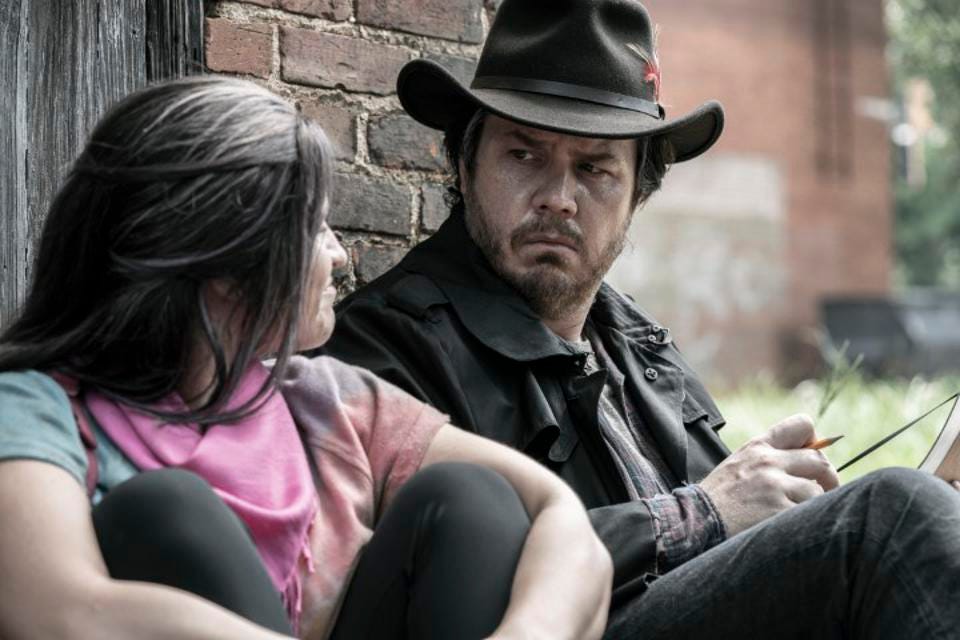NOTE: Full spoilers for this episode of, “The Walking Dead” are present in this review
It’s pretty clear at this point that something stinks at the Commonwealth. Connie seems to be particularly itching to pull on the thread of exactly what’s rotten underneath the seemingly utopian mega-community, and after a mysterious disappearance on his own turf, Eugene becomes equally obsessed with locating the seemingly inevitable trouble in his midst. “Rogue Element” may not have quite the same degree of momentum as the two previous episodes of The Walking Dead, but it still mostly works at balancing the simultaneous optimism and dread that now surrounds the series’ protagonists, as they seem to become entrenched even deeper in the powerful grip of their new home.
Eugene’s core plot naturally occupies the bulk of storytelling this week, and that’s good, considering that Eugene was weirdly absent during the survivors’ first full storyline within the Commonwealth. Eugene is definitely on the side of believing in the Commonwealth, and seemingly wanting to stay there permanently, at least at first, and that’s predictably because of his flourishing relationship with Stephanie. Inevitably though, said relationship couldn’t possibly last, and before long, Stephanie suddenly goes missing, with her apartment being cleaned out by mysterious repo men shortly after Eugene professes his love for her. Harsh, or potentially sinister!
The inevitability of Stephanie’s disappearance, and Eugene’s new romance ending in apparent tragedy, can’t be overstated, but I will say that it’s surprising how well The Walking Dead manages to execute this expected payoff, and still make it seem interesting. Eugene even forcibly recruits Princess on his quest to discover exactly what happened to his lady love, making for a very smart character duo for this major plot, both because Eugene and Princess have prior history before they ended up in the Commonwealth, and because Princess has her own history of mental health difficulties. This puts Princess into the awkward position of being the voice of reason to Eugene, after it becomes evident that Eugene is making up scenarios in his mind, when it’s more likely that Stephanie simply broke up with him and fled.
Despite the initial tension between Eugene and Princess over this issue however, Eugene is eventually proven correct, after he discovers that his worst suspicions are true; Stephanie was never real. In reality, “Stephanie” is a Commonwealth spy known as Shira (who, strangely, doesn’t appear to exist in the Walking Dead comic books), and she faked her relationship with Eugene in order to extract any necessary information about Alexandria, and its sister communities. Josh McDermitt absolutely nailed this crushing revelation to Eugene too, as Eugene emotionally falls apart before an apathetic Hornsby. Hornsby then in turn rationalizes his actions and those of Shira by reminding Eugene that Alexandria and its neighbours were going to starve without the help of the Commonwealth, and that all the Commonwealth ultimately demands is that Eugene and his fellow survivors be useful to them.
This is a bleak, but nonetheless valid outlook, even though we do still get a sliver of hope for Eugene to close out this episode. This comes once a heartbroken Eugene burns his Stephanie posters, as well as the sci-fi novel manuscript he shared with her, only to be greeted by Max, the assistant of Commonwealth boss, Pamela Milton. Max reveals at this point that she was actually the one communicating with Eugene over the radio, not Stephanie/Shira, possibly suggesting that there may be some hope yet for Eugene’s poor heart, as well as the quickly-eroding audience impression of the seemingly utopian Commonwealth. Or, is this yet another gaslighting of poor Eugene? We’ll have to wait and see, but I certainly hope not. The poor man has been through enough with women!

Outside of this main Eugene storyline, we did get a few more survivor perspectives to keep scratching at the Commonwealth’s dirty secrets, though this episode’s subplots didn’t feel quite as rewarding. Connie and Carol headlined said subplots to mixed effect, with Carol continuing to hang out with Hornsby (while he’s not tormenting poor, heartbroken Eugene anyway), while Connie provokes the wrath of her editor after refusing to stay on-script with the Commonwealth’s military reporting. Even Kelly seems eager to talk Connie down from her journalist crusade, though Connie nonetheless refuses to abandon the hidden truth, even if it means she burns every bridge at the Commonwealth in the process. This is fairly intriguing, but it doesn’t have a real payoff yet, beyond a currently-inconsequential revelation that Max is Mercer’s sister. Outside of that, Connie and Kelly mostly just chased their tails this week, and didn’t truly move the plot forward.
Carol at least was able to witness an interesting new side to Hornsby’s dealings, meanwhile, though like Kelly, Carol largely felt like a spectator within her own storyline in this case. Carol specifically rides along with Hornsby as he explores a ‘Lower Commonwealth’, namely an off-the-books opium operation that upper management seems to look the other way on, since it’s necessary to procure medical supplies for the Commonwealth’s hospital. Carol is thus left to observe and give her two cents on a pay dispute, eventually suggesting that the poppy-farming boss be arrested, an action that Hornsby quickly agrees with. I get that this is supposed to show Carol earning more influence in the Commonwealth, another narrative turn that’s bound to pay off later, but this is still another filler subplot that lacks a truly important result for now, since Carol is still ultimately biding her time in Hornsby’s company.
“Rogue Element” has the aftertaste of feeling like the latest filler episode for The Walking Dead’s super-sized final season, though it does at least excel with its engaging core storyline surrounding Eugene and Princess. Like I said, it was inevitable that Eugene’s relationship with, “Stephanie” wasn’t going to last forever, but the sheer emotional haymaker that the series delivered through Hornsby’s subterfuge was nonetheless astonishingly, and effectively, cruel. That’s why it’s too bad that Connie, Kelly and Carol didn’t have much to do but keep observing the Commonwealth throughout their own storylines this week. It’s clear that The Walking Dead really wants to take its time when it comes to peeling back every increasingly uncomfortable layer of the Commonwealth’s comforts, and the cost at which they’re achieved. It almost makes a legitimate case for why this world may be better off without some of its old institutions, perhaps creating an opportunity wherein this universe’s survivors should be fully embracing the idea of moving forward, even if that means permanently forsaking old notions about what humanity can achieve.

